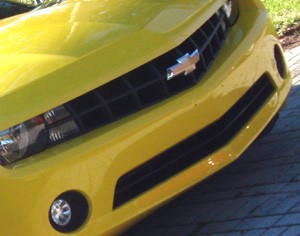Chevy Total Confidence Pricing and Love It or Return It
Published August 10, 2012 | Updated March 20, 2019
What is the Catch with new car Sales Programs Offered by Car Makers?

In the past, our consumer advocate team here at CarBuyingTips.com has seen ads from Chevrolet touting 2 different sales programs, one of them was called the Chevy Total Confidence Pricing, and the other was called the Love It or Return It program. The Total Confidence Plan was supposed to give you the confidence of some low purchase price, while Love It or Return It claimed to give you 60 days to return your new car if you don't like it.
But are these types of sales plans really that great? Here's our CarBuyingTips.com opinion on it.
Not Confident in the Total Confidence Pricing Plan
We have always had a distrust for marketers, and where would they be without their asterisks, superscripts and fine print? They are linguistic experts at using asterisks to completely reverse all their hot air marketing claims. They know just which words to stick into their marketing slick sheets that will trick your brain into thinking you are getting much more than you are receiving.
Before you enter a car dealership to shop for a new car, educate yourself first with our consumer advocate advice guide on How to buy a new car and avoid dealer scams first.
So, let's cut through all the red tape and shine some light onto these types of new car advertisements, and reveal for you what these sales programs are actually doing. You might find programs like this from other makers as well, The Chevy Total Confidence Pricing plan is basically a fancy marketing term for what we in the car industry call the no-haggle price.
Sales program names are often camouflaged No-Haggle car pricing schemes
You are likely to find car makers coming up with creative names to avoid the stigma of no-haggle pricing, a worn-out business model that has already overstayed its welcome. This has already frustrated car buyers in the past, knowing that no-haggle essentially meant no decent price just a little of the window sticker price to make it look like you were getting a good price.
Chevy was vague about their new car pricing and exactly how much you'll save off the sticker price, so when you see plans like this advertised that you never heard of before, expect them to be a gimmick, not a gimme. A No-haggle price can be good, and it can also be not so good, and we have seen more often than not, the no-haggle price is higher than it should be, then they charge $900 dealer prep fees on top of that.
This isn't just icing on the car dealer's cake, this is icing on the icing. Luckily as you spend time here on CarBuyingTips.com and read our New Car Buying Guide, you'll have a heads up for when these pricing schemes pop up in front of your face.
You'll also learn by reading our guide how to use our free download Buyers Offer Spreadsheet to determine if indeed you are getting a good price from the car dealer and what price you should be paying for your new car.
We hare at CarBuyingTips.com have never been fans of no-haggle pricing, it just means "here's the price" now shut up. Unfortunately, too many American car buyers fall victim to marketing, and no-haggle means no math. They foolishly trust the word of the salesperson that they are getting a great price, without checking the math first. Often the no-haggle price has rebates built into it, so it makes you think you're getting a lower price when you really are not.
For example, suppose Honda is offering a $1,500 rebate. Your new Honda Accord has a window sticker price of $23,000, and a dealer offers you a no-haggle price of $21,500, so you think you got a good deal. The problem is if you strip out the rebate (which is from the factory, not the dealer), you see the dealer charged you the full sticker price of $23,000 for this Honda Accord so you really paid full sticker price. This is how no-haggle deals snare many victims.
It's time to make the dealer give up a little too so that maybe the car could have been bought for $20,000. So, how about it, was Chevrolet's Total Confidence Pricing plan a good deal? It's only a good deal if you do the math first and you use our car buying guides to determine how much you should pay for this car.
Their sales plan was only active for a few months. It looks like programs like these are intended to unload current year model inventory in preparation for next year model releases.
Love It or Return It Program
Only new cars purchased over a window of time lasting just a few months were eligible for this program, so if you buy a dealership manager's "special" car with 2,000 miles on it, that car was not eligible. Chevy's claim was that you had 60 days to love your new car or return it. Or was that really the case? Let's examine it a bit closer into the fine print and weasel clauses to see what the real deal was.
After reading through their rules of this program, it seems once again the marketers were misleading us with Enron type math and Theranos logic that would make Elizabeth Holmes proud. You were required to keep the car for at least 30 days, and you were only allowed to return the car for buy-back from day 31 to day 60, which means they really should have called this a 30-day plan.
Also, if you return the car under Chevrolet's program, you don't get the tax back, because that went to the state. So, if you return a $25,000 car you'll lose $1,500 in tax money. Seriously? That's enough reason for us to never use this plan or any other car maker's plan like this.
You should always be suspicious of guaranteed buyback plans with new cars because no car dealer ever wants the hassle of taking a car back.
Typical Scenarios That Might Make Your Car Ineligible For Buyback:
- If the vehicle has been wrecked or has damaged, it is not eligible for the buyback
- Sorry folks, businesses, corporations, partnerships, or fleet sales are not eligible for buyback
- Leased cars are not eligible
- GM Employees or Dealership Employees are ineligible
- Cannot have more than 4,000 miles on it if you return the car
That filters out just about every car out there making most new cars sold under buyback plans like this ineligible for the buyback. There are a lot of legal weasel clause hurdles for you to jump through to get them to take the car back if you don't like it.
You must take your vehicle to the selling dealer to have the vehicle appraised. What if the dealer says it's a no go? Then you can't return it. The biggest hurdle in this program is if you return your new car, you will not get your trade-in back, so now you will be stuck without a car.
This plan sounded like a great plan from their advertisements, but in reality, with a short time span and many hurdles, it seems virtually useless to most people, here's why:
You Also Have to Perform the following steps to be eligible for the 60-day new car buy-back program:
- Your Bill of Sale, all loan papers and documentation so don't lose them!
- Copy of your Driver's License
- Copy of your Registration showing vehicle is registered in your name
- Proof of Insurance verifying that you have insured it since the delivery date
- Any other documentation GM or the Administrator may "reasonably" request
- Must return the vehicle to the original selling dealer
- You must contact the administrator of the program and submit all required documentation
In summary, we think the Love It or Return It program appeared on the surface like a good "gesture" on Chevrolet's part but has so many hurdles that it's unlikely anyone will ever use the program. Happy car shopping, use common sense, check all the numbers first.
Don't take anyone's word that their price is the best. Always verify every claim they make, and always determine what would make you ineligible to cash in on any of these sales programs which car dealers and car manufacturers dangle in front of your face.

About The Author: Jeff Ostroff
A lifelong consumer advocate with over 20 years of unparalleled expertise, Jeff is the Founder, CEO and Editor-In-Chief of CarBuyingTips.com. As chief consumer advocate, he oversees a team of experts who cover all aspects of buying and selling new and used cars including leasing and financing.
For decades, Jeff has been the recognized authority on vehicle purchasing, sought out often by the media for his decades of experience and commentary, for live call-in business radio talk shows and is cited often by the press for his expertise in savvy car shopping methods and preventing consumer scams and online fraud. Jeff has been quoted in: CNN, MSNBC, Forbes, New York Times, Consumer Reports, Wall Street Journal and many more.
Jeff also has extensive experience and expertise in new car brokering and selling used cars for clients on eBay and Craigslist. Connect with Jeff via Email or on Twitter.







